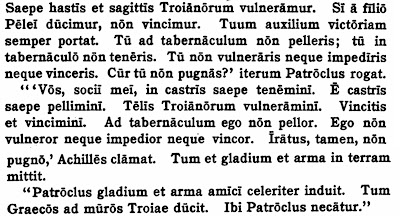FĀBULA ORBILĪ II
[A]
Achillēs, fīlius Pēleī, est clārus Graecus. sī cōpiās
Graecās dūcit, Graecīs victōria est. sed Achillēs īrātus est quod captīva
pulchra ab eō rapta est. itaque in tabernāculō sedet neque pugnat. Patrōclus
amīcus cum sociīs multīs ad tabernāculum venit.
‘cūr prō patriā nōn pugnās, amīce?’ Patrōclus rogat. ‘tū ā
Troiānīs maximē timēris. nōs impedīmur quod tū nōn pugnās.’
‘ego ā Troiānīs timeor. quod cōpiās nōn dūcō, vōs
impedīminī. īrātus, tamen, prō patriā nōn pugnō,’ Achillēs respondet.
‘nōs in castrīs ā lēgātīs tenēmur quod tū in
tabernāculō sedēs. interdum nōs ē castrīs ā copiīs Troiānīs pellimur.
saepe hastīs et sagittīs Troiānōrum vulnerāmur. sī ā fīliō Pēleī
dūcimur, nōn vincimur. tuum auxilium victōriam semper portat. ..
Sentence building; find the Latin
[i] timeō, -ēre [2]: fear
I am feared │ I am feared by the Trojans
You (sg.) are feared │ You (sg.) are feared by the Trojans │
You (sg.) are most greatly feared by the Trojans
[ii] impediō, -īre [4]: hinder; impede
You (pl.) are hindered
[iii] teneō, -ēre [2]: keep; hold
We are held │ We are held by the lieutenants │ We held in
the camp by the lieutenants
[iv] pellō, -ere [3]: drive (out)
We are driven out │ We are driven out by the Trojan forces │
We are driven out of the camp by the Trojan forces
[4] vulnerō, -āre [1]: wound; injure
We are wounded │ We are wounded by the spears and arrows │ We
are wounded by the spears and arrows of the Trojans
[5] dūcō, -ere [3]: lead
We are led │ If we are led │ If we are led by the son │ If
we are led by the son of Peleus
[6] vincō, -ere [3]: conquer
We are not conquered
[B]
‘ .. tū ad tabernāculum nōn pelleris; tū in
tabernāculo nōn tenēris. tū nōn vulnerāris neque impedīris neque
vinceris. cūr tū nōn pugnās?’ iterum Patrōclus rogat.
‘vōs, sociī meī, in castrīs saepe tenēminī. ē
castrīs saepe pelliminī. telīs Troiānōrum vulnerāminī. vincitis
et vinciminī. ad tabernāculum ego nōn pellor. ego nōn
vulneror neque impedior neque vincor. īrātus, tamen, nōn
pugnō,’ Achillēs clāmat. tum et gladium
et arma in terram mittit.
Patrōclus
gladium et arma amīcī celeriter induit. tum Graecōs ad mūrōs Troiae dūcit. ibi
Patrōclus necātur.
[B] Sentence building; find the Latin
[7] I …
am not driven to the tent
am not being injured, nor hindered, nor conquered
[8] You (sg.) …
are not driven (back) to the tent
are not being held in the tent
are not being injured, nor wounded, nor conquered
[9] you (pl.) …
are (often) held │ are often held in the camp
are (often) driven │ are (often) driven out of the camp
are being injured │ are being injured by the weapons ¦ of
the Trojans
[10] Petroclus [= he]
is killed
What are the passive endings for [i] tū / 2nd
person singular and [ii] vōs / 2nd person plural?



No comments:
Post a Comment